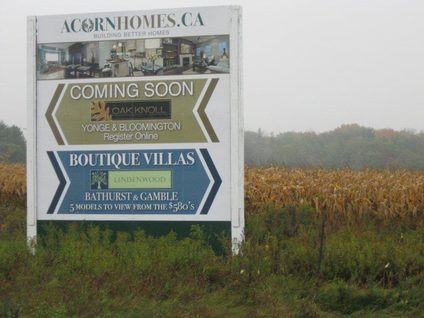
By John Bacher
Photo: Urban Sprawl on Oak Ridges Moraine threatens health of Lake Ontario. By: Mary Lou Bacher
The province of Ontario is engaged in what is termed a decade long review of the Greenbelt Plan and its complimentary legislation, Places to Grow. (the latter is intended to provide higher densities so that sprawl does not jam up against urban boundaries). A public meeting on the review, appropriately enough in a location accessible to cyclists, walkers and transit, is being held on March 30, from 6 to 9pm at the central Yonge Street Toronto Public Library.
The recent death of a prophetic voice of concern for the earth, Dr. Mike Carr, should give some guidance to the deliberations of the public. It is to be fervently hoped that as many people cram into the Toronto Reference Library to give voice to concerns for the fate of the planet as occupied St. James Cathedral square.
The title of Carr’s great work, “Bioregionalism and Civil Society: Democratic Challenges to Corporate Globalism”, (published by University of British Columbia Press) gives some sense as to what the provincial reviews are all about. In articulating bioregionalism as a force for democratic change, Carr properly used the example of efforts to restore salmon from long vanished watersheds, degraded by over a century of abuse from deforestation and pollution.
Carr understood the importance of salmon as a keystone species. His example was the Mattole watershed of northern California, where after decades of struggle, determined citizen activism had the King Salmon return and flourish. Those who wrought this miracle of restoration understood that salmon “inform, and thereby help to organize human activity.”
In his organizing, a campaign for being a federal MP and university teaching. Carr stressed how it was possible to make Vancouver, a salmonopolis. (salmon city). While ambitious in his adopted city, Vancouver, many would see such a goal as bizarre in his home town of Toronto.
Few realize however, that a land locked race of Atlantic Salmon flourished in Lake Ontario until 1896. (the last was found in a Wilmot Creek, named after the Samuel Wilmot who tried to rescue the species). Wilmot found too late, much as the early start of salmon restorers in California in the 1970s chronicled by Carr, that it was not enough to have a hatchery release salmon into streams. What had to change were the conditions for the whole watershed. To his shock, Wilmot discovered this when the removal of forests on the Oak Ridges Moraine, caused his hatchery one year to be wiped out in a landslide.
Now that the Oak Ridges Moraine and much of the landscape of southern Ontario has been reforested, determined efforts are being made to restore the Atlantic Salmon. Surprisingly, one of the rivers where this has had the most success in terms of a population that is able to actually reproduce itself, is the Credit River, flowing through Mississauga.
To some extent what the Greenbelt protects is the future to have our western Lake Ontario watershed again be a salmonopolis. Urban sprawl is the biggest threat to the re-forested landscape that makes salmon recovery a possibility. It also threatens to dump huge amounts of sediments and other contaminates into the streams which must have clarity and cold temperatures for salmon to reproduce.
Stopping sprawl will not be easy. Outside urban boundaries around Toronto is a vast area termed, the “White Belt”, or jokingly mimicking Greenbelt language, “the Unprotected Countryside”. These are lands currently in agriculturally zoning, which are not protected by the Greenbelt.
It is usually difficult in our society, to be an earth protector. One person who was able to succeed was Danny Beaton (Mohawk Six Nations), who went to jail for protecting the world’s purest water in his struggle against Dump Site 41. He refused bail conditions for his convictions against blockading an access road where a garbage dump was being constructed over aquifer. His words were, “Who Will Speak for the Water.”
Today to speak for the water and the forests that protect the water it is not necessary to be arrested. All you have to do is speak out clearly at Greenbelt consultations and say, “Turn the White Belt into the Greenbelt.”

